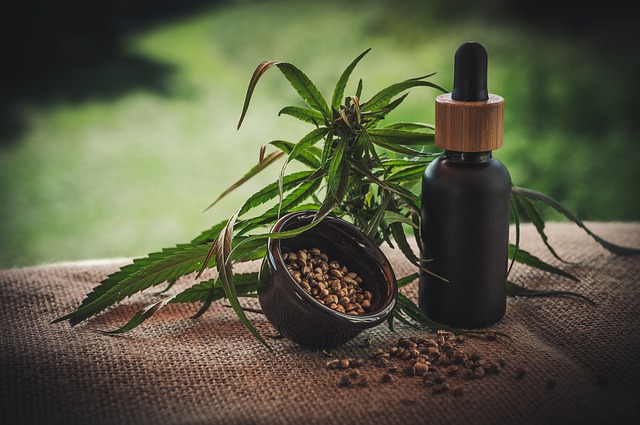
This story originally appeared on Leaf Report
There’s no question cannabidiol (CBD) products are flying off shelves. As a new study from the Brightfield Group shows, sales of CBD are on track to grow by 14% in 2020. But, amidst a flood of new CBD brands and flashy products, it can be challenging to find a CBD product best for you.
Let’s start with the basics: CBD is the second-most dominant ingredient found in the cannabis plant, is non-psychoactive, and may offer a myriad of health benefits for issues like insomnia, anxiety, and chronic pain. Legal CBD is extracted from dried and cured hemp flower, which is a cannabis plant that contains less than 0.3% THC and is federally legal in the U.S. The compound is then processed into one of three concentrate forms— full-spectrum, broad spectrum distillate, or isolate.
Which type of concentrate is used is dependent on price point and the type of CBD product the company makes. CBD products include everything from bath bombs to salves, and oil tinctures and infused edibles are consumer favorites according to 2020 market research.
Types of CBD Concentrates
Full Spectrum. Full spectrum CBD usually appears like a thick, dark oil and contains everything that naturally exists in the plant: cannabinoids, terpenes, flavonoids, and other plant matter. Franny’s Farmacy, a seed to sale CBD company based in Asheville, NC, uses full-spectrum CBD oil almost exclusively, due to the benefits they find in incorporating as much of the whole plant as possible.
“If you have all of [the components] in there together, you have the entourage effect, the belief that everything works better together,” said Tacy, the owner of Franny’s Farmacy. (The existence of the entourage effect is bolstered by several studies, and hotly disputed by the scientific community.)
But, because it’s made from the whole plant, including trace amounts of THC, full-spectrum CBD may have a strong taste and smell and can be priced higher than other CBD products on the market. Also, full-spectrum may be a liability for those who need to be completely THC-free.
“We live in Asheville, and there’s a lot of people here that get drug tested,” said Tacy. “There’s people like, ‘I can’t have any [THC].”
Broad-Spectrum and Distillate. Broad-spectrum is CBD without THC, but with most of the other constituents in hemp.
Extracted as a full-spectrum oil, it then undergoes additional refinement to become broad spectrum distillate. It can also be made by starting with isolate and adding certain cannabinoids, terpenes, and flavonoids back in. Either way, the end result should be a thick, honey-like and concentrated substance, with at least 80% CBD content, and containing all the cannabinoids, terpenes, and flavonoids naturally present in the plant, except the THC.
The biggest benefits of broad-spectrum distillate is that it allow consumers to avoid THC, without completely eliminating the chance of the entourage effect, and it’s available in most popular types of CBD products. That said, it may not be as beneficial to some users as full-spectrum CBD.
Isolate. CBD Isolate is pure CBD. It is made from continuing the refinement process used for broad-spectrum CBD until just the CBD in solid crystalline or powder form is left.
The biggest advantage of isolate is that, it will not contain any THC. For that reason, isolate also offers the highest concentration of CBD usually over 99% pure. “Meaning that one gram of isolate powder carries about 990 mg of CBD,” as hemp farmer Augustine Hanger told Royal CBD. But, this also means there is no possibility of the entourage effect.
Still, considering that many human studies use dosages anywhere between 20 and 1,500 milligrams (mg) per day, you’d think that concentrated isolate would work fine. Unfortunately, studies show that full and broad-spectrum are still more effective overall.
In this study in mice from 2015, they gave mice with inflammation CBD isolate and full-spectrum CBD. Their results showed that while the CBD isolate did offer some health benefit for the isolate group, it had less of a therapeutic effect on the inflammation than for the full-spectrum CBD group. Plus, the isolate only offered relief at a specific dose, while full-spectrum offered more relief as the dosage increased.
Still, CBD isolate could be the perfect fit for someone depending on the severity of their pain and definitely has an important place on the market.
How To Pick The Product For You
There is a lot of subpar CBD flooding the market, but there are some key things you can look for as a consumer to protect yourself against bad quality and overpriced CBD.
Franny’s Farmacy holds their product to a rigorous standard by quality testing their products and publishing a certificate of analysis (COA) on their website and Tacy encourages consumers to expect nothing less, especially because the market is still unregulated. Trustworthy brands with COAs publish the results on their website and usually puts stickers on their product that certifies the CBD product was tested for harmful additives like heavily metals and fertilizers, and that it is the quality and potency advertised.
After finding a trustworthy brand, choosing a CBD product that works for your issue involves a lot of trial and error, because the effectiveness of CBD is reliant on a variety of factors including diet, consumption method, and condition-dependent dose.
For that reason, Tacy suggests going to see a medical cannabis specialist at your local dispensary that can actually talk with you and suggest products based on your needs. From there, you should start with a low dose and adjust based on how you feel.
“To have that ability to go in and actually talk and look at products and have a discussion can be a world of change for somebody. I really recommend that as people are learning about it,” she said. “It’s really easy to figure it out once you start experimenting what works, what doesn’t. Start low [dose] and go slow.”
 Investment value finders Investment value finders
Investment value finders Investment value finders



